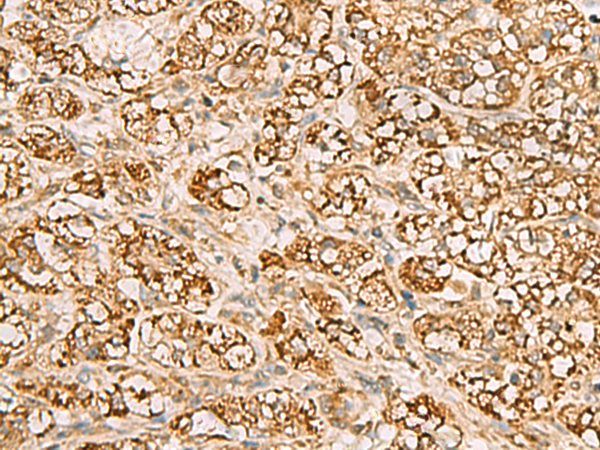
| WB | 咨询技术 | Human,Mouse,Rat |
| IF | 咨询技术 | Human,Mouse,Rat |
| IHC | 1/50-1/200 | Human,Mouse,Rat |
| ICC | 技术咨询 | Human,Mouse,Rat |
| FCM | 咨询技术 | Human,Mouse,Rat |
| Elisa | 1/5000-1/10000 | Human,Mouse,Rat |
| Aliases | BDMF; MSAP; DMSFH; LGMBF; DMSMFH; c86fus; HEL-249 |
| Host/Isotype | Rabbit IgG |
| Antibody Type | Primary antibody |
| Storage | Store at 4°C short term. Aliquot and store at -20°C long term. Avoid freeze/thaw cycles. |
| Species Reactivity | Human |
| Immunogen | Fusion protein of human MTAP |
| Formulation | Purified antibody in PBS with 0.05% sodium azide and 50% glycerol. |
+ +
以下是3篇与MTAP抗体相关的文献摘要信息,供参考:
1. **文献名称**:Loss of Methylthioadenosine Phosphorylase (MTAP) Expression in Mesothelioma Predicts Poor Patient Survival
**作者**:Pulford E, et al.
**摘要**:研究通过免疫组化分析MTAP在间皮瘤中的表达缺失,发现MTAP蛋白缺失与患者预后不良相关,表明MTAP可作为潜在的诊断标志物和治疗靶点。
2. **文献名称**:MTAP Deletion Confers Enhanced Dependency on the PRMT5 Arginine Methyltransferase in Cancer Cells
**作者**:Marjon K, et al.
**摘要**:研究利用MTAP抗体验证癌细胞中MTAP基因缺失,发现此类细胞对PRMT5抑制剂敏感性增加,揭示了MTAP缺失肿瘤的合成致死治疗策略。
3. **文献名称**:A Rapid Diagnostic Assay for Detection of MTAP Protein Loss in Glioblastoma
**作者**:Inoue D, et al.
**摘要**:开发了一种基于MTAP抗体的快速免疫染色方法,用于胶质母细胞瘤样本中MTAP蛋白缺失的临床检测,为个性化治疗提供依据。
(注:以上内容为示例性概括,实际文献需通过学术数据库检索获取完整信息。)
Methylthioadenosine phosphorylase (MTAP) is a key enzyme in the methionine salvage pathway, catalyzing the conversion of methylthioadenosine (MTA) to adenine and 5-methylthioribose-1-phosphate. This metabolic pathway is critical for recycling methionine and adenine, particularly in conditions of limited nutrient availability. The MTAP gene is located on chromosome 9p21.3. a genomic region frequently deleted in various cancers, including glioblastoma, pancreatic cancer, and melanoma. Loss of MTAP expression is often linked to co-deletion with the tumor suppressor gene CDKN2A, making MTAP deficiency a potential biomarker for 9p21 loss and a therapeutic target.
MTAP antibodies are widely used in research to detect MTAP protein levels via techniques like immunohistochemistry, Western blotting, or flow cytometry. These antibodies help assess MTAP status in tumors, which has gained interest due to its implications in precision medicine. MTAP-deficient cancers exhibit metabolic vulnerabilities, such as heightened sensitivity to inhibitors of de novo purine synthesis (e.g., L-alanosine) or methionine deprivation therapies. Additionally, MTAP loss may influence the tumor microenvironment by accumulating MTA, which has immunomodulatory effects. Recent studies explore MTAP’s role in predicting response to therapies targeting PRMT5 or MAT2A, offering novel strategies for treating MTAP-deficient malignancies. Overall, MTAP antibodies serve as essential tools for understanding cancer metabolism and developing targeted therapies.
×